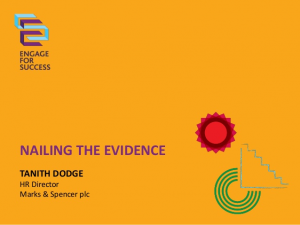It’s not just about the money.
5 reasons why you need to give people a sense of purpose – and the evidence for them.
What does purpose mean?
Purpose is about making meaning for people and raising horizons beyond profit to focus on why we exist and what we do for others. During a recent webinar on organisational purpose, I argued it is a key driver of success.
Do organisations understand this?
Well, yes and no. I asked webinar participants a series of questions about their own workplaces. It seems that organisations understand it’s important to give their people a sense of purpose but only about half of them are investing in doing so.
Here are the full results:
| Question
|
Yes (%) | No (%) |
| We have a clear purpose | 78 | 22 |
| Our purpose is focused on what we do for others | 84 | 16 |
| We understand the business benefits of having a clear Purpose | 81 | 19 |
| We invest in building shared Purpose | 51 | 49 |
These suggest that the real challenge is how to encourage organisations to invest in building shared purpose. Indeed, the first question of the webinar was “How do you persuade a CEO to invest in building shared purpose?”
So here are five sources to provide advocates for purpose with some ammunition to support their arguments.
1. People want meaning not money
People who spend money on others are happier – around the world. Giving is a universal human driver. “Pro-social spending and happiness” is a study conducted by Elizabeth Dunn, Lara Aknin and Michael Norton in February 2014. Research shows that people with more money are somewhat happier than those with less money, this study demonstrates that how people spend their money really matters for their happiness.
Adam Grant, the professor of psychology at Warton, also demonstrated that connecting fundraisers with beneficiaries improves their performance, as recounted in his bestselling book “Give and Take”.
The research organisation Gallup argued that Millenials are more concerned about Organisational Purpose than their pay checks in their 2016 study “How millennials want to work and live.”
People look for meaning beyond profit or financial performance. Simon Sinek (“Start with Why”) and Dan Pink (“Drive – the surprising truth about what motivates us”) make the same argument in their TED talks and books.
2. People who are engaged with the purpose of their organisation people perform better
Engagement is positively correlated with financial performance, customer satisfaction, innovation, lower costs and faster adoption of new practices. It is enabled by four factors which include a strong leadership narrative that “is a clearly expressed story about what the purpose of an organisation is, why it has the broad vision it has, and how an individual contributes to that purpose.”

3. Our brains are not wired as rational, logical calculating machines
Emotions matter (love, hate, friendship, rivalry, etc.) but until Daniel Kahneman and Amos Tversky we did not know how much. Unless we are careful, almost all decision-making, judgement and motivation is dominated by our lazy brains and our tendency to fall back on our biases and shortcuts.
Neuroscientists like Matthew Lieberman, Roy Baumeister and Naomi Eisenberger are helping us understand some of the core drivers that help us perform at our best. My colleague and friend Hilary Scarlett captured it in her SPACES framework: Self-esteem, Purpose, Autonomy, Certainty, Equality and Social relationships.
4. Customers value brands that make meaning
There was a time when brands focused on price differentials and offering products that were “reassuringly expensive.” Those days have gone as Havas Media Group’s meaningful brand survey shows. What matters are brands that have a deeper purpose and that benefit our personal and collective well-being.
Havas reviewed 1,500 global brands and more than 300,000 interviews. They identified that meaningful brands like Google, Pay Pal, You Tube and WhatsApp have outperformed the stock market by 206% over the last ten years. These brands do not set out to sell us things. Instead they help us achieve what we want and are based around a promise to support others in achieving what they want.
5. Purposeful companies are more successful
In 2017 the Purposeful Company task force concluded that “Purpose is key to corporate and economic success. Great companies are enabled by the pursuit of clearly defined visionary corporate purposes, which set out how the company will better peoples’ lives.”
The enquiry explored how to create longer-term value and build Britain’s competitive advantage. The work included a review of 15 academic studies exploring the evaluation of purposefulness on performance.
Co-chaired by Will Hutton and Clare Chapman, the task force’s steering group included leading figures from the London and Said Business Schools, and the Bank of England. Its work featured contributions from FTSE 100 organisations and leading investment houses.
This wealth of data supports the contention that Purpose delivers Performance. Ironically, the message for the CEO who insists that purpose is maximising shareholder value is that he or she can make more money for shareholders by setting horizons above the financial goals.



